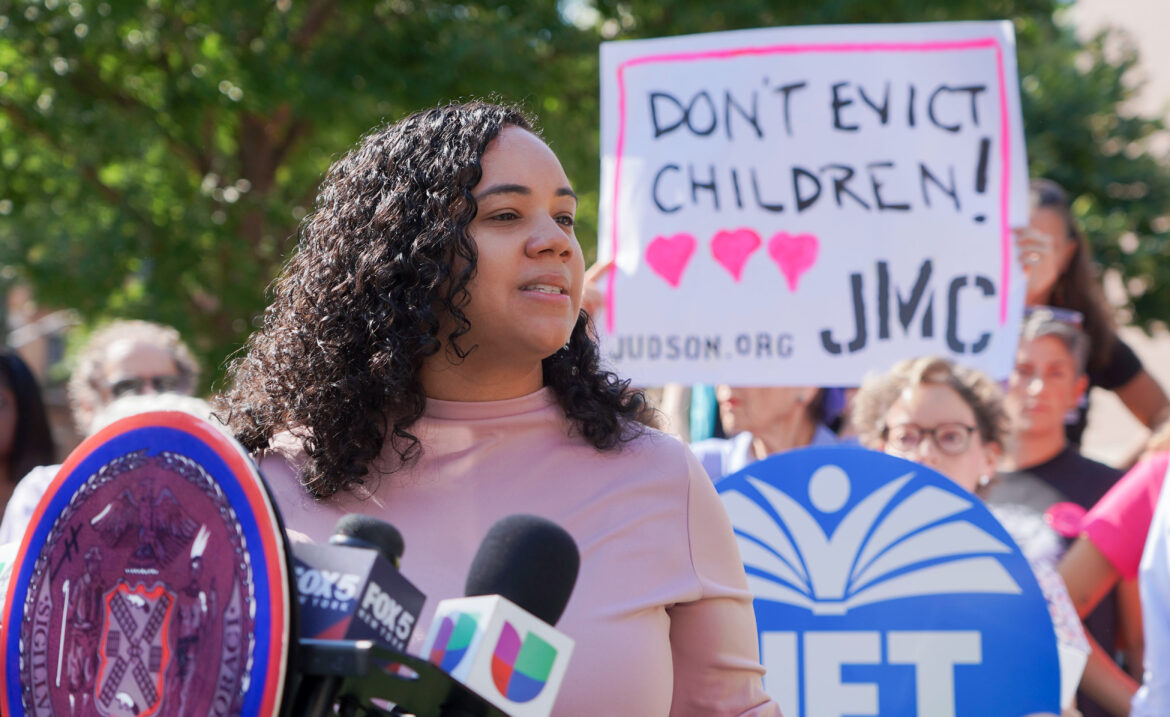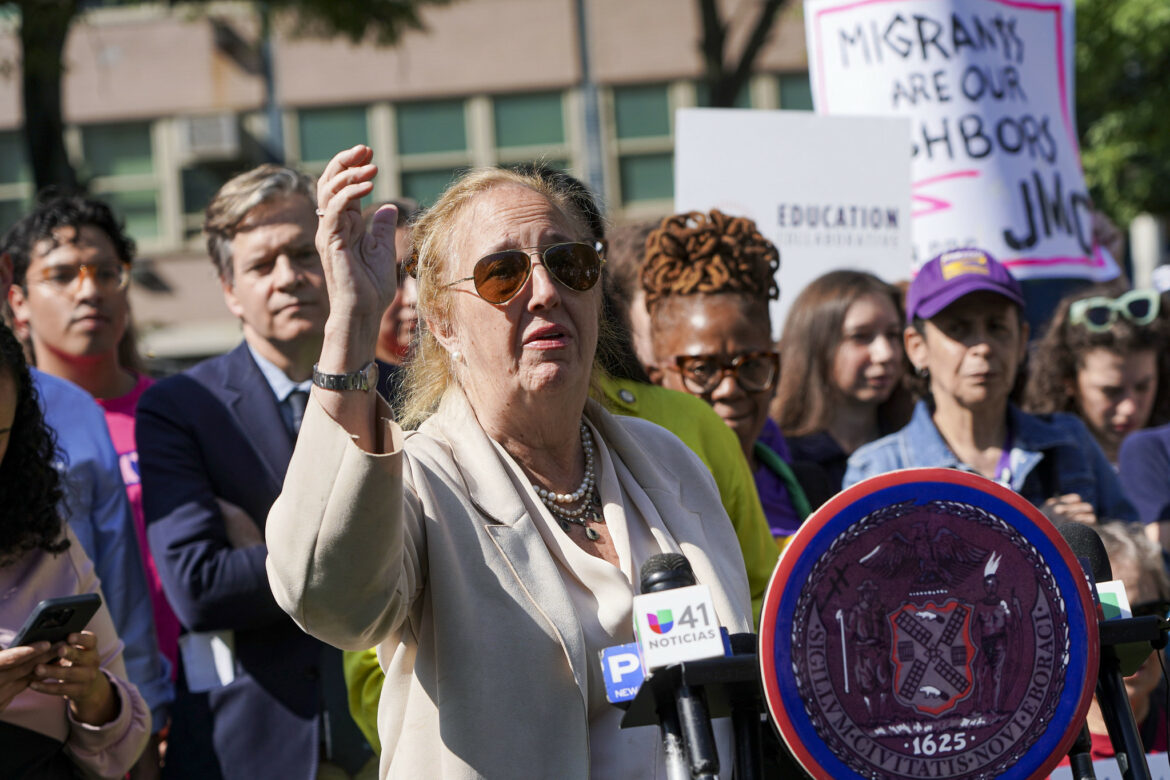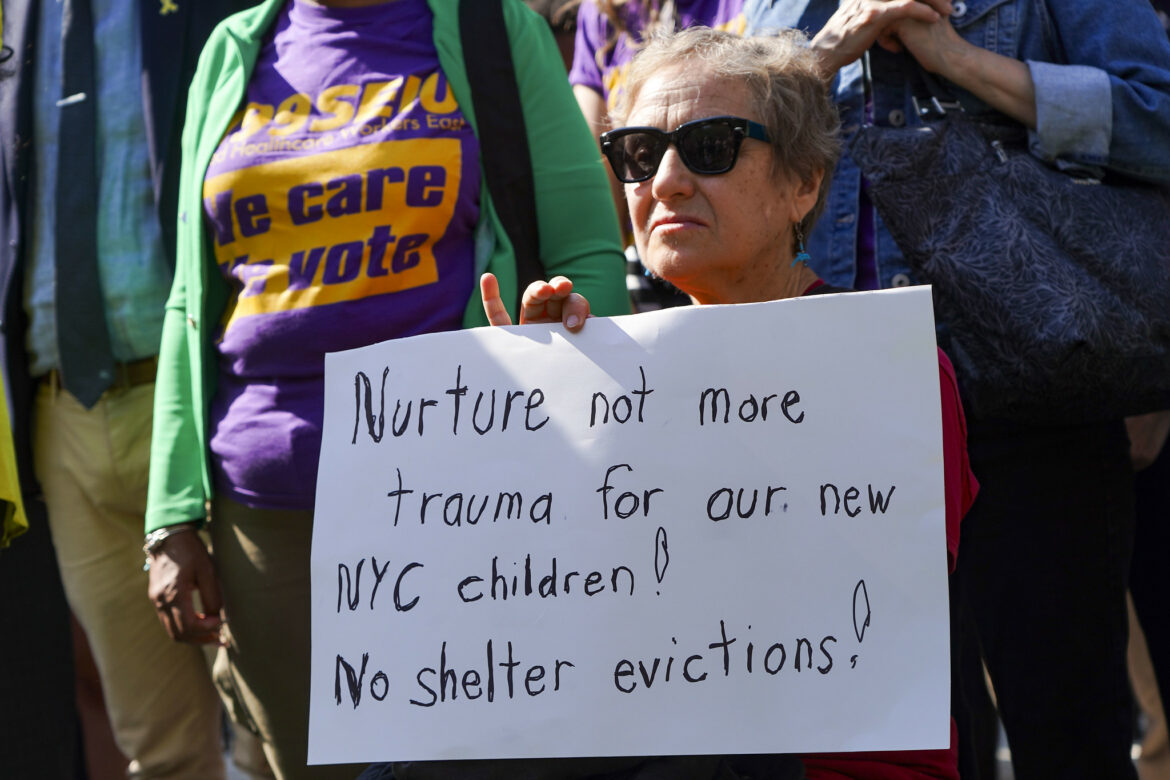As of Aug. 18, the city had issued 60-day deadlines to 12,689 families with children, including 18,348 children under 18, officials said. Critics say frequent shelter moves are disruptive to kids’ ability to learn.

Gerardo Romo / NYC Council Media Unit
“Nobody leaves their home country, the things and the roots that they know, to come and struggle in another country unless there is no other option available to them,” Councilmember Carmen De La Rosa said at Wednesday’s rally.A day before public schools reopened in New York City, elected officials, advocates, and community members gathered to protest Mayor Eric Adams’ policy that evicts migrants and asylum-seeking families—including school-going children—from the city’s homeless shelters every 30 or 60 days.
Limiting the stays of asylum seekers in shelters disrupts the lives of students, is financially wasteful, and reflects xenophobia, the group charged. As of Aug. 18, the city had issued 60-day deadlines to 12,689 families with children, including 18,348 children under 18, according to New York City Comptroller Brad Lander, who cited his office’s investigation on the implementation of the policy.
Those numbers represent families staying in shelters run by agencies other than the Department of Homeless Services. The city recently sought and received permission from the state to begin issuing the time notices to migrant families with kids in DHS shelters as well—more than 30,000 people at the end of June—who were previously exempt from the policy.
“This is shameful,” Councilmember Shahana Hanif said at Wednesday’s rally, held in Audubon Park in Washington Heights. “Children should be focused on their education, not on whether they have roofs over their heads or be able to stay in their school.”
While families with children can reapply for a new placement after their time runs out, Hanif said that the process of eviction, re-application, and moving to another shelter every two months could repeat up to five times in a single school year.
“This policy undermines educational outcomes, disrupts family stability and raises serious concerns about the risk of children experiencing street homelessness,” she said. In March, Hanif introduced the Intro. 210, which would prohibit city agencies from imposing such time limits.
Similarly, at the state level, Senator Brad Hoylman-Sigal has also sponsored a bill prohibiting the same at homeless shelters operated by state agencies.
“Do we really want to see more children riding the subways during the school day, selling candy with their parents because they have no place to go, because they have no resources to use?” said Sen. Hoylman-Sigal at the protest.
Another councilmember flagged how the deadlines could impact funding for schools, as students who transfer throughout the year as they move between shelters. The city’s public schools get funding largely based on the number of students they enroll. An enrollment tally is taken each year on Oct. 31, and schools that lose or see an influx of new students after that date may struggle to right-size their budgets, some have warned.
“For God’s sake, do not, Mr. Mayor, move families before first [of] November. You know what’s going to happen. Those schools are going to lose money,” said Councilmember Gale A. Brewer.

Gerardo Romo / NYC Council Media Unit
Manhattan Councilmember Gale Brewer speaking at Wednesday’s rally.
Advocates also brought up the practical challenges of navigating New York City as a newcomer, and how frequent shelter moves can exacerbate those hardships.
“Maybe they already knew which train they need to take in order to take this kid to school,” Valeria Paz Reyes from New York Immigration Coalition said at the rally. “And again, they don’t speak the language, they don’t understand the subway system, they don’t understand the education system.”
“Imagine someone that just came a couple months ago that is trying over here to create their new home, so it’s just creating unnecessary challenges and obstacles that don’t help anyone in the community,” she added.
Michelle Ferreira from the nonprofit Housing Works said one of her clients was relocated from Bowery Residents Committee to another shelter in Brooklyn because of the 60-day policy. Ferreira is now working with the client to set up their mental healthcare and primary care providers closer to their home.
“When they move you from place to place, everything has to start all over again,” she said, recalling her own experience in the shelter system as a parent of young kids 25 years ago.
“That was a very big hard burden with a 3-year-old and two little ones. I had to get up at six o’clock and take them to school [in the Bronx]. It was so, so hard but I had to make it work because that’s my kids,” she said.
Echoing similar concerns, Councilmember Carmen De La Rosa said she is also the daughter of immigrants. Had it not been for public education in the U.S., her parents would have never migrated from the Dominican Republic.
“Nobody leaves their home country, the things and the roots that they know, to come and struggle in another country unless there is no other option available to them,” she said.
Responding to these criticisms, the mayor’s office said it has served over 214,600 migrants over the last two years, including assisting 70,000 individuals apply for asylum, Temporary Protected Status, and work authorization.
“Thanks to our measured approach, not a single family with children has been forced to sleep on the streets, and our 30- and 60-day policies have allowed us to manage this crisis in a compassionate and fiscally responsible way,” City Hall said in the statement.
“We continue to intensify our case management and assist migrants in their resettlement process, and we will continue to support all students and their families and ensure there is no gap in services—whether they transition to a new school community or choose to stay in their current school.”
Between Aug. 26 and Sept. 1, more than 700 migrants entered the city’s care, and more than 900 left during the same period, according to City Hall.

Gerardo Romo / NYC Council Media Unit
A protestor holds a sign condemning the shelter deadlines policy at a rally in Manhattan on Sept. 4, 2024.Also speaking at the protest was a single mother, Lily Burd. Her two children went to Castle Bridge school in Washington Heights, where many of their classmates’ families were affected by the 30- and 60-day policy. As a parent, Burd said routines have helped her family become successful.
“If we can’t have a routine, if that changes every 30 days, we’re always disoriented, discombobulated, and it becomes really difficult to thrive and to then attend to the real moments with your children,” she said.
To reach the reporter behind this story, contact Subeksha@citylimits.flywheelstaging.com. To reach the editor, contact Jeanmarie@citylimits.flywheelstaging.com
Want to republish this story? Find City Limits’ reprint policy here.








